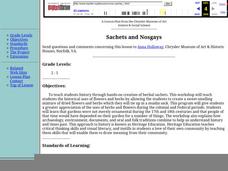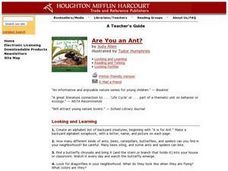Curated OER
Activities in A Science Classroom
Learning Through Games and Activities Make Staying On Task in the Classroom Fun
Curated OER
The Old White Sheet Trick
Students attract night animals. In this Science lesson, students use a large white surface and a light at night. Students observe and record what they see.
Curated OER
Nature's Perfect Recycler
What a great way to start a recycling lesson! Introduce your students to the dung beetle! They will get a kick out of "nature's perfect recycler," when they learn about the scarab beetle's way of life: eating dung and rotting...
Curated OER
Who Am I?
Young biologists can see a variety of animals, amphibians, mammals, insects and clearly identify them. They match up the animals' names with the picture. The pictures are clear and colorful! A very nice worksheet for early elementary...
Curated OER
Sachets and Nosgays
An impressive lesson plan on the many uses of gardens during the Colonial and Federal periods of history is here for you. In it, learners explore the uses of flowers and herbs grown in gardens at that time; from deodorants, to insect...
Desert Discoveries
What's the Buzz on Native Bees?
Young biologists describe the different types of bees that are native to the Sonoran Desert. They look at the nesting and feeding requirements of the insects, and study how they are able to pollinate many plants found in the environment....
Curated OER
Pollination and Fertilization
Save yourself time by using this concise arrangement of slides about pollination and fertilization in plants. Minimal wording is included, but the graphics are educational. You will also find charts for the adaptations of both...
Curated OER
Alternative Animal Agriculture
Presenting an unusual topic, this collection of slides examines alternative animals that can be grown for profit or human use. It details the raising of rabbits as food, llamas for textiles, earthworms as fish bait, and a variety of...
ARKive
Marvellous Mini-beasts – Design a Species
Here is a creative activity that teaches kids how species evolve different characteristics for survival. The lesson begins as the class discusses and examines the adaptive traits of mini-beasts or insects. Then, in small groups, they...
New South Wales Department of Education
Photosynthesis
Venus fly traps photosynthesize and consume insects because the soil they live in does not provide enough nutrients. Scholars analyze historical scientific experiments to learn how scientists discovered photosynthesis. From their...
PHET
Color Vision
Humans can only see visible light, but some insects can see ultraviolet light. Through a simulation, pupils explore how we see colors using one bulb. It moves on to demonstrate how we see colors by mixing three different bulbs (red,...
Alabama Wildlife Federation
Itsy Bitsy Spider
Bring the outside in to make observations in a controlled environment. Pupils learn about predator-prey relationships with spiders firsthand. They first construct a spider habitat and then feed the spider insects to make observations...
Curated OER
Are You an Ant?
Young scholars investigate different insects in their backyard. In this insect lesson, students read the book Are You and Ant? and apply the reading to their backyards. Young scholars create a list of animals that begin with the the...
Curated OER
I Wish I Were a Butterfly
Young scholars inquire about biology by reading a children's book in class. In this insect instructional activity, students read the story "I Wish I Were a Butterfly" and identify the unique characteristics of butterflies and other...
Curated OER
Darwin’s Bees
What do you call a bee born in May? A maybe! This first instructional activity in a series of four begins with a starter activity to get scholars thinking about the topic. Then a circus, or circuit of seven activities, show Darwin's...
Curated OER
What Kind of Insect is That?
Fifth graders characterize insects and classify insects according to the Linnaean system. They use hand lenses or microscopes to examine insect body parts.
Curated OER
Adopt-An-Insect
In this biology instructional activity, learners locate examples of various types of insects listed in the chart and receive a point value for each according to its significance. Then they identify body parts and habitat for each item.
Curated OER
Adopt-An-Insect Bingo
In this biology instructional activity, students select twenty-five terms relating to insects to complete their bingo card as listed on the sheet. Then they match each name or family with its correct description.
Curated OER
Insect Monitoring
Students practice the scientific method in the classroom, either in preparation or as a substitution for real-world field experience. They examine a simulated biodiversity research situation, using a "mini-plot" or
sampling square...
Curated OER
Science - Learning About Migration
For this animal migration worksheet, students learn about animals that migrate. They then answer the 11 questions on the worksheet. The answers are on the last page of the packet.
American Museum of Natural History
Wonderful World of Wasps
Shockingly, wasps sometimes challenge lions as the king of predators! Learners explore the life of a wasp in an interactive online lesson. They read about the characteristics of wasps and then complete activities to learn about their lives.
Cornell University
Field Day: Be an IPM Detective
Become a pest detective! Individually or in small groups, scholars scout the land to discover which pests—plant and animal—inhabit it, determine whether the pests are endangering the environment, and summarize their findings.
Cornell University
Weed IPM
Go on a weed hunt! Scholars gain insight into the characteristics of plants and examine the outdoor environment in order to identify five different types of weeds. Learners then show what they know with a one-page reflection.
Chymist
Landfills and Recycling
Examine the nature of landfills through experimentation. Scholars build miniature landfills and monitor changes over a six-week period. Observations allow individuals to draw conclusions about the different types of trash and their...
Other popular searches
- Insects Science
- K 2 Life Science Insects
- Parts of Insects Science
- Life Science Insects
- Esl Lessons Science Insects
- Esl Science Insects

























